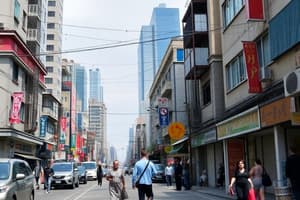Podcast
Questions and Answers
What is one major consequence of urbanization on the environment?
What is one major consequence of urbanization on the environment?
- Higher levels of greenhouse gas emissions (correct)
- Reduction in average urban temperatures
- Increased groundwater recharge
- Decreased energy consumption
Why do cities experience the 'heat island' effect?
Why do cities experience the 'heat island' effect?
- Lower human population density
- Absence of buildings and roads
- Increased vegetation cover
- Structures that absorb and retain heat (correct)
How can urban areas negatively impact local water patterns?
How can urban areas negatively impact local water patterns?
- Promoting excessive evaporation
- Enhancing natural filtration of rainwater
- Preventing rainwater from soaking into the ground (correct)
- Increasing soil absorption
What is a suggested method to counteract the effects of urbanization on climate?
What is a suggested method to counteract the effects of urbanization on climate?
Which of the following is NOT a result of urbanization?
Which of the following is NOT a result of urbanization?
Flashcards are hidden until you start studying
Study Notes
Urbanization
- Defined as the movement of people from rural areas to urban centers, leading to city expansion.
- Increased construction of buildings and infrastructure such as roads, resulting in more land covered by concrete and asphalt.
Effects of Urbanization on Climate Change
- Greenhouse Gas Emissions: Urban areas consume significant energy for heating, cooling, and transportation, predominantly sourced from fossil fuels. This results in substantial greenhouse gas (GHG) emissions.
- Heat Islands: Urban environments create "heat islands" due to structures like buildings and roads absorbing heat, contributing to elevated city temperatures compared to surrounding rural areas.
- Reduction of Green Spaces: Urbanization reduces the presence of trees and green spaces, which are essential for cooling air and absorbing CO2. This decrease leads to higher atmospheric CO2 levels.
- Increased Pollution: Urban settings can produce heightened air pollution from vehicles, industrial activities, and other sources. This pollution is detrimental to health and contributes further to GHG emissions.
- Altered Water Patterns: Urban development changes natural water flow, as impervious surfaces prevent rain absorption, increasing surface runoff and flooding risks, impacting local climates and ecosystems.
Solutions to Mitigate Urbanization Impact
- Green Architecture: Implementation of energy-efficient building designs and the use of renewable energy sources can effectively lower GHG emissions.
- Enhancing Green Spaces: Initiatives to plant trees and establish parks in urban areas can significantly absorb CO2 and mitigate heat effects.
- Promoting Sustainable Transportation: Encouraging public transport, biking, and walking reduces reliance on cars, thereby lowering emissions.
- Waste Reduction Strategies: Emphasizing recycling and minimizing waste can diminish the volume of waste directed to landfills, which produces harmful gases.
Studying That Suits You
Use AI to generate personalized quizzes and flashcards to suit your learning preferences.




